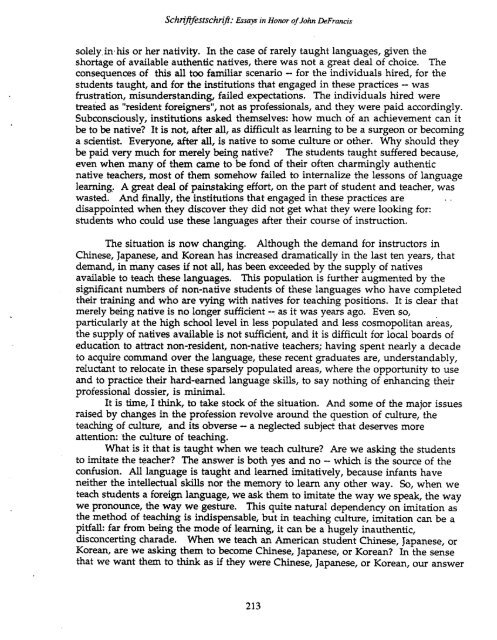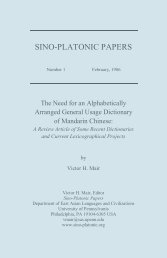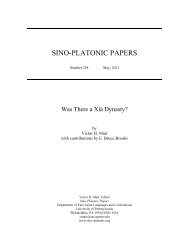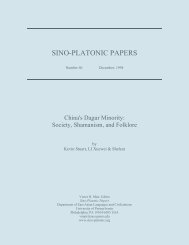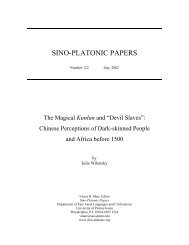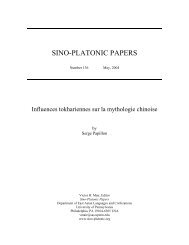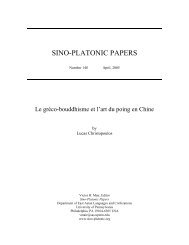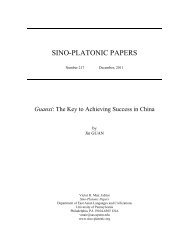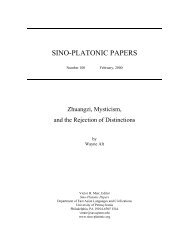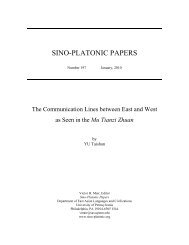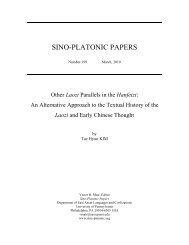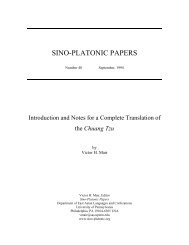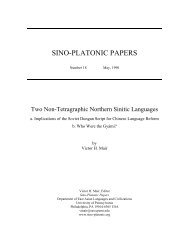Essays on Writing and Language in Honor - Sino-Platonic Papers
Essays on Writing and Language in Honor - Sino-Platonic Papers
Essays on Writing and Language in Honor - Sino-Platonic Papers
You also want an ePaper? Increase the reach of your titles
YUMPU automatically turns print PDFs into web optimized ePapers that Google loves.
Schriftes~schri!: <str<strong>on</strong>g>Essays</str<strong>on</strong>g> <strong>in</strong> H<strong>on</strong>or of John DeFrancis<br />
sole1y.k his or her nativity. In the case of rarely taught languages, given the<br />
shortage of available authentic natives, there was not a great deal of choice. The<br />
c<strong>on</strong>sequences of this all too familiar scenario - for the <strong>in</strong>dividuals hired, for the<br />
students taught, <strong>and</strong> for the <strong>in</strong>stituti<strong>on</strong>s that engaged <strong>in</strong> these practices - was<br />
frustrati<strong>on</strong>, misunderst<strong>and</strong><strong>in</strong>g, failed expectati<strong>on</strong>s. The <strong>in</strong>dividuals hired were<br />
treated as "resident foreigners", not as professi<strong>on</strong>als, <strong>and</strong> they were paid accord<strong>in</strong>gly.<br />
Subc<strong>on</strong>sciously, <strong>in</strong>stituti<strong>on</strong>s asked themselves: how much of an achievement can it<br />
be to be native? It is not, after all, as difficult as learn<strong>in</strong>g to be a surge<strong>on</strong> or becom<strong>in</strong>g<br />
a scientist. Every<strong>on</strong>e, after all, is native to some culture or other. Why should they<br />
be paid very much for merely be<strong>in</strong>g native? The students taught suffered because,<br />
even when many of them came to be f<strong>on</strong>d of their often charm<strong>in</strong>gly authentic<br />
native teachers, most of them somehow failed to <strong>in</strong>ternalize the less<strong>on</strong>s of language<br />
learn<strong>in</strong>g: A great deal of pa<strong>in</strong>stak<strong>in</strong>g effort, <strong>on</strong> the part of student <strong>and</strong> teacher, was<br />
wasted. And f<strong>in</strong>ally, the <strong>in</strong>stituti<strong>on</strong>s that engaged <strong>in</strong> these practices are . .<br />
disappo<strong>in</strong>ted when they discover they did not get what they were look<strong>in</strong>g for:<br />
students who could use these languages after their course of <strong>in</strong>structi<strong>on</strong>.<br />
The situati<strong>on</strong> is now chang<strong>in</strong>g. Although the dem<strong>and</strong> for <strong>in</strong>structors <strong>in</strong><br />
Ch<strong>in</strong>ese, Japanese, <strong>and</strong> Korean has <strong>in</strong>creased dramatically <strong>in</strong> the last ten years, that<br />
dem<strong>and</strong>, <strong>in</strong> many cases if not all, has been exceeded by the supply of natives<br />
available to teach these languages. This populati<strong>on</strong> is further augmented by the<br />
sigruhcant numbers of n<strong>on</strong>-native students of these languages who have completed<br />
their tra<strong>in</strong><strong>in</strong>g <strong>and</strong> who are vy<strong>in</strong>g with natives for teach<strong>in</strong>g positi<strong>on</strong>s. It is dear that<br />
merely be<strong>in</strong>g native is no l<strong>on</strong>ger sufficient - as it was years ago. Even so,<br />
particularly at the high school level <strong>in</strong> less populated <strong>and</strong> less cosmopolitan areas,<br />
the supply of natives available is not sufficient, <strong>and</strong> it is difficult for local boards of<br />
educati<strong>on</strong> to attract n<strong>on</strong>-resident, n<strong>on</strong>-native teachers; hav<strong>in</strong>g spent nearly a decade<br />
to acquire comm<strong>and</strong> over the language, these recent graduates are, underst<strong>and</strong>ably,<br />
reluctant to relocate <strong>in</strong> these sparsely populated areas, where the opportunity to use<br />
<strong>and</strong> to practice their hard-earned language skills, to say noth<strong>in</strong>g of enhanc<strong>in</strong>g their<br />
professi<strong>on</strong>al dossier, is m<strong>in</strong>imal.<br />
It is time, I th<strong>in</strong>k, to take stock of the situati<strong>on</strong>. And some of the major issues<br />
raised by changes <strong>in</strong> the professi<strong>on</strong> revolve around the questi<strong>on</strong> of culture, the<br />
teach<strong>in</strong>g of culture, <strong>and</strong> its obverse - a neglected subject that deserves more<br />
attenti<strong>on</strong>: the culture of teach<strong>in</strong>g.<br />
What is it that is taught when we teach culture? Are we ask<strong>in</strong>g the students<br />
to imitate the teacher? The answer is both yes <strong>and</strong> no - which is the source of the<br />
c<strong>on</strong>fusi<strong>on</strong>. All language is taught <strong>and</strong> learned imitatively, because <strong>in</strong>fants have<br />
neither the <strong>in</strong>tellectual skills nor the memory to learn any other way. So, when we<br />
teach students a foreign language, we ask them to imitate the way we speak, the way<br />
we pr<strong>on</strong>ounce, the way we gesture. This quite natural dependency <strong>on</strong> imitati<strong>on</strong> as<br />
the method of teach<strong>in</strong>g is <strong>in</strong>dispensable, but <strong>in</strong> teach<strong>in</strong>g culture, imitati<strong>on</strong> can be a<br />
pitfall: far from be<strong>in</strong>g the mode of learn<strong>in</strong>g, it can be a hugely <strong>in</strong>authentic,<br />
disc<strong>on</strong>cert<strong>in</strong>g charade. When we teach an American student Ch<strong>in</strong>ese, Japanese, or<br />
Korean, are we ask<strong>in</strong>g them to become Ch<strong>in</strong>ese, Japanese, or Korean? In the sense<br />
that we want them to th<strong>in</strong>k as if they were Ch<strong>in</strong>ese, Japanese, or Korean, our answer


